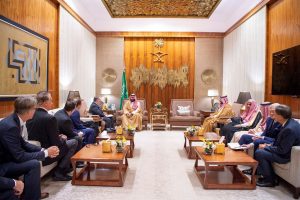RIYADH (Reuters) – Saudi Arabia’s Crown Prince Mohammed bin Salman held a rare meeting with American evangelical Christians on Thursday, as the ultra-conservative Muslim kingdom seeks to open up more to the world and repair an image of religious intolerance.

Saudi Crown Prince Mohammed bin Salmanin meets with the delegation of American Evangelical Christian Leaders in Riyadh, Saudi Arabia November 1, 2018. Bandar Algaloud/Courtesy of Saudi Royal Court/Handout via REUTERS
The delegation was led by communications strategist Joel Rosenberg and included former U.S. Congresswoman Michele Bachmann, according to an emailed statement by the group, as well as heads of American evangelical organizations, some with ties to Israel.
“It was a historic moment for the Saudi Crown Prince to openly welcome Evangelical Christian leaders to the Palace. We were encouraged by the candor of the two-hour conversation with him today,” the statement said.
The delegation also met Saudi officials including Foreign Minister Adel al-Jubeir, Saudi Ambassador to Washington Prince Khalid bin Salman, and secretary-general of the Muslim World League Mohammed al-Issa.
A visit by such prominent non-Muslim leaders, who estimate they represent about 60 million people, is a rare act of religious openness for Saudi Arabia, which hosts the holiest sites in Islam and bans the practice of other religions.
Some of the figures’ support for Israel, which the kingdom does not recognize, is also striking. For instance, Mike Evans, founder of the Jerusalem Prayer Team, describes himself on his website as “a devout American-Christian Zionist leader”.
Saudi Arabia has maintained for years that normalizing relations with Israel hinges on its withdrawal from Arab lands captured in the 1967 Middle East war – territory Palestinians seek for a future state.
But increased tension between Tehran and Riyadh has fueled speculation that shared interests may push Saudi Arabia and Israel to work together against what they regard as a common Iranian threat.
Prince Mohammed, who in recent years has loosened strict social rules and arrested Saudi clerics deemed extremists, said in April that Israelis are entitled to live peacefully on their own land. A month earlier, Saudi Arabia opened its airspace for the first time to a commercial flight to Israel.
Several members of the delegation, which met with Abu Dhabi’s Crown Prince Mohammed bin Zayed in the United Arab Emirates earlier in the week, have also advised U.S. President Donald Trump on faith issues.
(Reporting by Stephen Kalin; Editing by James Dalgleish)
 Saudi Crown Prince Mohammed bin Salmanin meets with the delegation of American Evangelical Christian Leaders in Riyadh, Saudi Arabia November 1, 2018. Bandar Algaloud/Courtesy of Saudi Royal Court/Handout via REUTERS
Saudi Crown Prince Mohammed bin Salmanin meets with the delegation of American Evangelical Christian Leaders in Riyadh, Saudi Arabia November 1, 2018. Bandar Algaloud/Courtesy of Saudi Royal Court/Handout via REUTERS

Ezekiel 38 and 39. On Israel’s side when the Russian axis attacks is Sheba and Dedan (Saudi Arabia and the Gulf States) as well as Tarshish (UK) and Britains’ ex-colonies Australia, Canada and the US. But the US is out of the picture (civil war, EMP, Democrat government, Yellowstone, who knows) and so it is left to the UK to challenge Russia verbally only.
it’s interesting to say the least